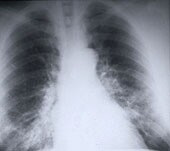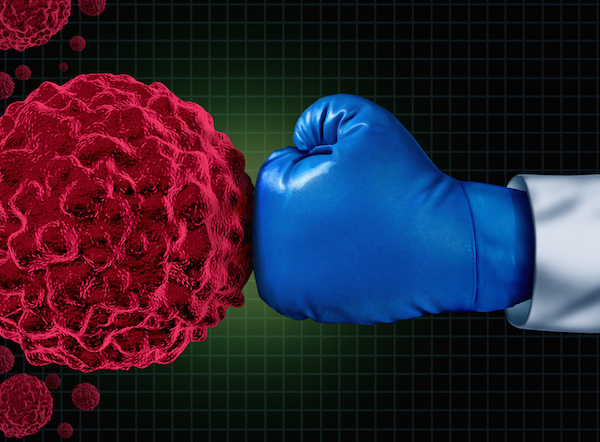
THURSDAY, July 21 (HealthDay News) — New research finds that the targeted cancer drug Tarceva nearly triples the amount of time lung cancer patients survive without a recurrence and has fewer side effects than standard chemotherapy.
The authors of a study appearing in the July 21 online issue of The Lancet Oncology recommend using Tarceva (erlotinib) as a first-line treatment for patients with advanced non-small-cell lung cancer who have the particular gene mutation this drug targets.
Other experts agreed.
“This is a very important study [because] it shows that we can identify patients with a specific genetic marker and direct specific treatment toward them,” said Dr. Jay Brooks, chairman of hematology/oncology at Ochsner Health System in Baton Rouge, La.
“In the past, if a patient needed system-wide treatment, it would be chemotherapy. However, now it’s clear that we need to check for the EGFR mutation, and if they have that mutation it is likely that it is better for that patient as their initial treatment to get erlotinib instead of chemotherapy,” added Dr. Alan Astrow, director of hematology and medical oncology at Maimonides Medical Center in New York City. “It’s an important result.”
The findings echo the results of previous randomized trials but, according to the authors, this is the first study to show that patients with the EGFR mutation who take Tarceva can live for more than a year without their cancer returning.
The study was partially funded by F. Hoffmann-La Roche Ltd., maker of Tarceva.
Lung cancer is the most difficult to treat and most deadly of all cancers. Non-small-cell lung cancer (NSCLC) is the most common form of this malignancy.
Right now, Tarceva is approved to use as a second-line treatment for lung cancer.
Because it’s the only drug in its class approved in the United States, “this actually has impact on what we have available to treat patients in this country,” said Dr. Bruce Johnson, director of the Lowe Center for Thoracic Oncology at Dana Farber Cancer Institute in Boston.
This phase 3 trial involved 165 patients in China with advanced NSCLC and the EGFR mutation who were randomized to get either Tarceva or up to four cycles of the chemotherapy drugs gemcitabine plus carboplatin.
Thirty percent of Asians have the EGFR mutation compared with about 8 percent of white patients, although the authors stated that response rates to Tarceva are about the same in both groups.
People who received Tarceva survived an average of 13.1 months without a recurrence, versus only 4.6 months in the chemo group.
Significantly, those in the Tarceva group had far fewer severe side effects than those in the chemo group.
The cost of Tarceva — about $3,000 a month — is equivalent to chemotherapy, depending on which chemo regimen is used. The rate of hospitalization from side effects is much lower in those receiving Tarceva, Johnson said.
Testing for the EGFR mutation is widely available. Many independent labs do the test, and larger cancer centers can do it in-house, said Johnson, who is one of the patent holders on the EGFR mutation test.
More information
The U.S. National Cancer Institute has more on lung cancer.

